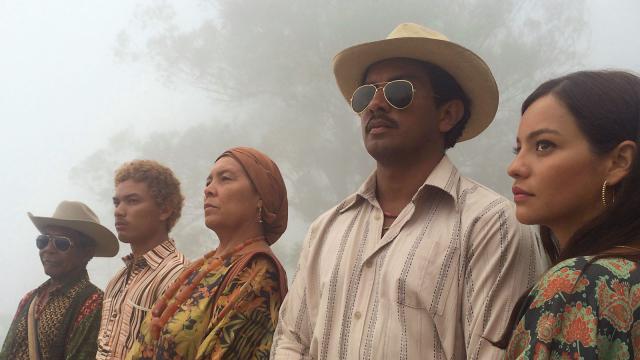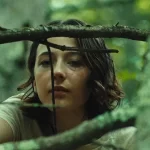Sundance 2019: Birds of Passage, by David Bax

In his entrancing 2015 film Embrace of the Serpent, Ciro Guerra balanced a deep respect with an anthropological fascination with the lives and cultures of Amazonian tribes aching to preserve their way of life in the 20th century. Now, with Birds of Passage, Guerra has teamed up with co-director Cristina Gallego and, though they’ve moved the setting up a few decades to the 1960s and 70s and set their sights on a more modernized Native American ethnic group, the new film shares many of the concerns of its predecessor. Gallego and Guerra’s presentation may have taken the form of a more recognizable and palatable genre movie but its beauty and power still lies in its loving and patient portrayal of traditions of dance, clothing and, most importantly, values.
In its broadest strokes, Birds of Passage is a retread of the familiar tale of an ambitious young man rising through the ranks of the drug and crime underworld, not unlike Brian De Palma’s Scarface or Ted Demme’s Blow, with a little bit of The Godfather’s familial backdrop thrown in. José Acosta stars as Rapayet, a member of the Wayuu people with no surviving immediate family and little to his name, who wishes to marry Zaida (Natalia Reyes), the daughter of Úrsula (Carmiña Martínez), one of their clan’s most respected elders. Looking to secure the large dowry Zaida’s family demands, he expands his coffee trading business to include marijuana, which he provides to a large scale buyer he meets through American Peace Corps volunteers. As the years go on, Rapayet, Zaida and Úrsula, along with their extended family, become massively wealthy but also increasingly at odds with other Wayuu clans and families, as well as with their own identities.
Acosta’s performances is intentionally opaque. This is, to some extent, because Gallego and Guerra position Rapayet as a figure not unlike David Lean’s Lawrence, open to a hundred different interpretations, none of them obvious. We get an impression of subjectivity; only languages Rapayet understands are subtitled, for instance. But if we are inside his head, we still can’t say for sure what’s going on in it. The rest of the reason for Acosta’s inscrutability is that (again, as with Embrace of the Serpent), characters in Birds of Passage tend to represent ideas. Each is an avatar of innocence, greed, respect, recklessness or whatever the directors need them to be in that particular scene to further their mournful allegories.
Yet Gallego and Guerra avoid polemics because they refuse to instruct the audience in how to interpret the parables they’re programming. Their openness is reflected in the movie’s aesthetics. Long takes of animals—crickets and birds that reappear throughout and no doubt carry their own metaphorical weight—go on without comment. The Wayuu marriage dance continues in symmetrical frames for minutes on end in a beautiful, uncondescending scene that inspires both awe and alien discomfort. Though the film never brushes up against the supernatural like Embrace of the Serpent did, the effect is no less mythical.
Birds of Passage’s refusal to judge is what elevates it. Of course, there can be no doubt that Gallego and Guerra are angered by the deleterious effect colonialism has on the histories and identities of the colonized. But they also leave room to question the wisdom of immutability in the face of change. When things go wrong for Rapayet and his family, Úrsula believes steadfastly that it is because they failed to follow Wayuu traditions. Yet an argument can also be made that their undoing is the result of standing by those traditions in a world that no longer allows for them. Sadly, their fates were likely sealed, in either case, by world events set in motion centuries before they were born in countries they’ll never visit.




























